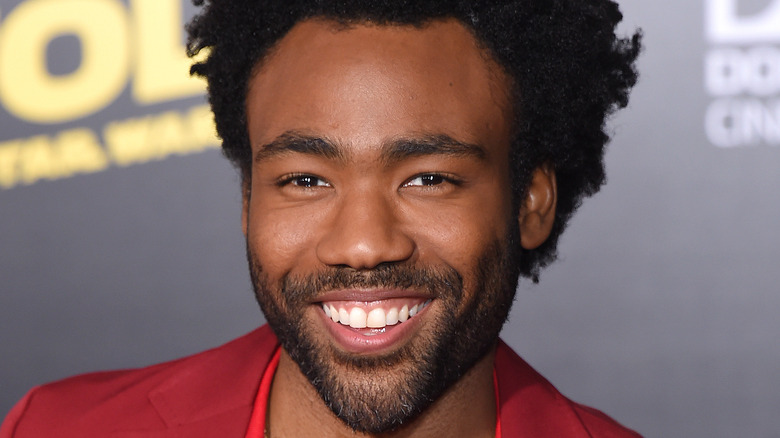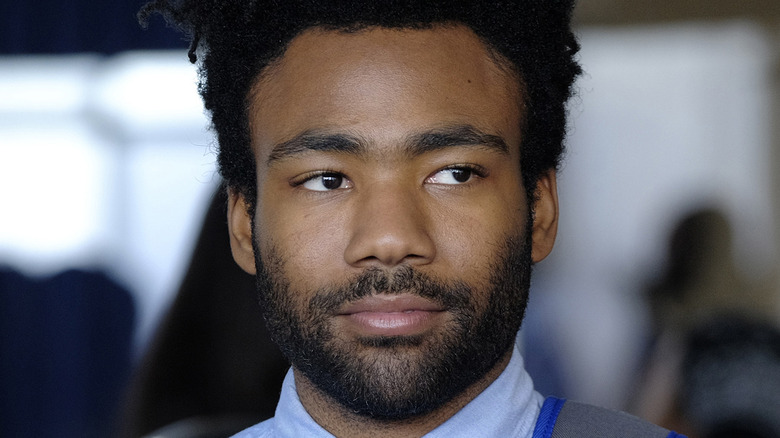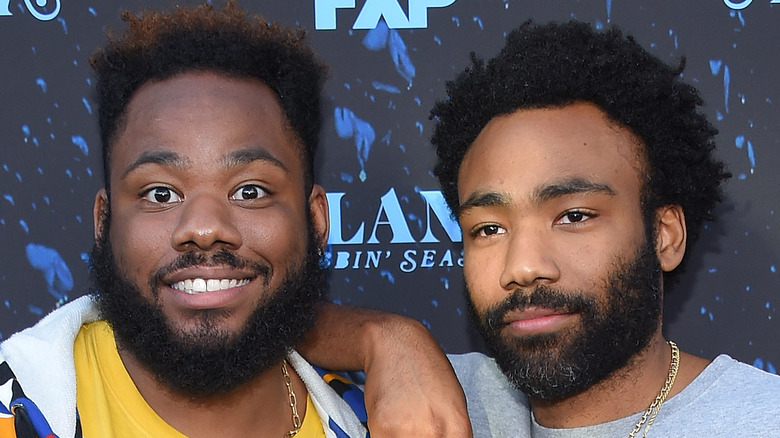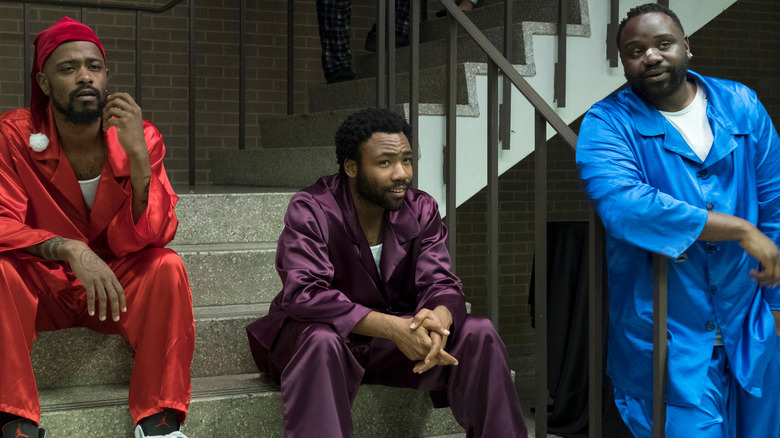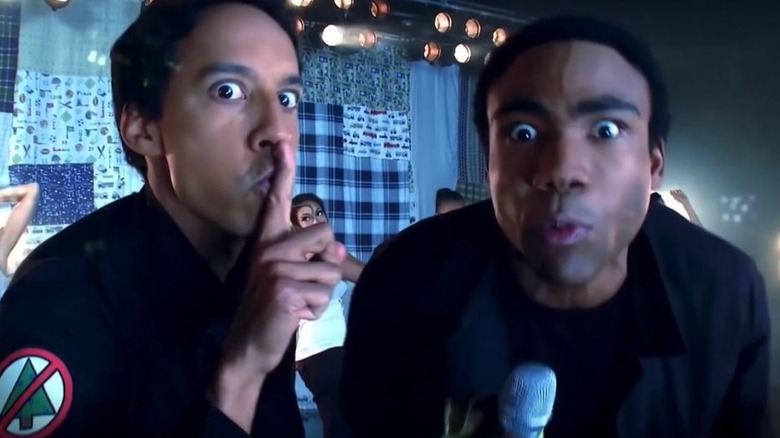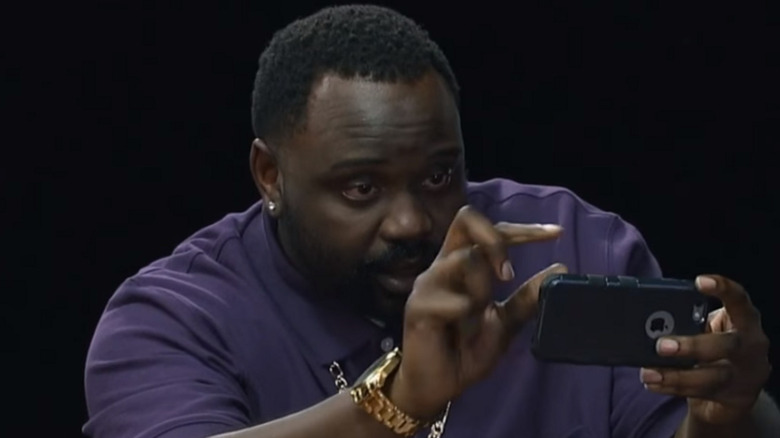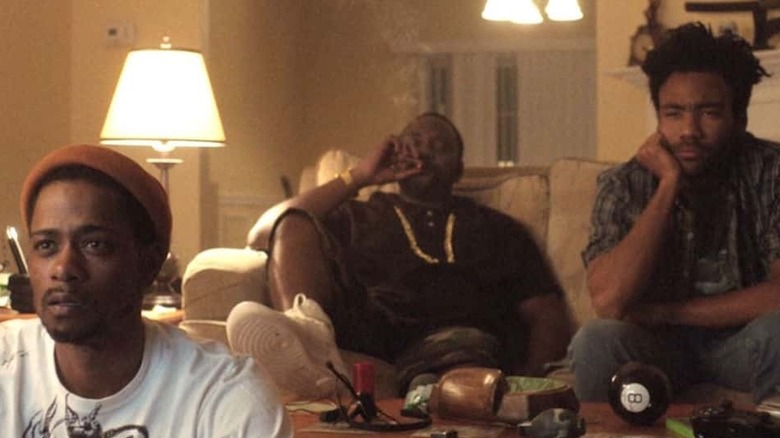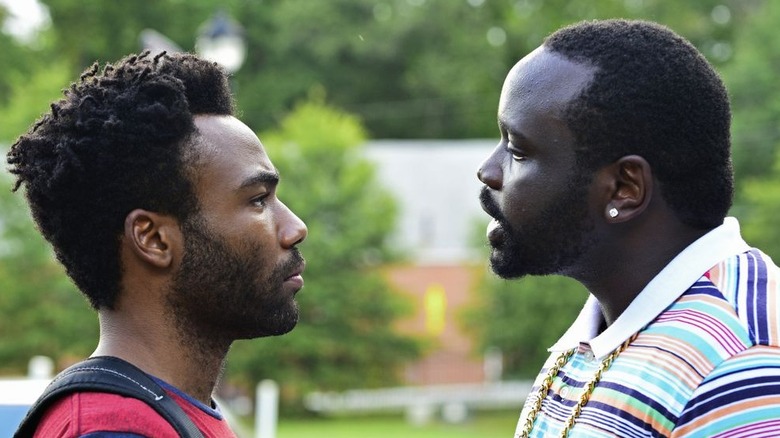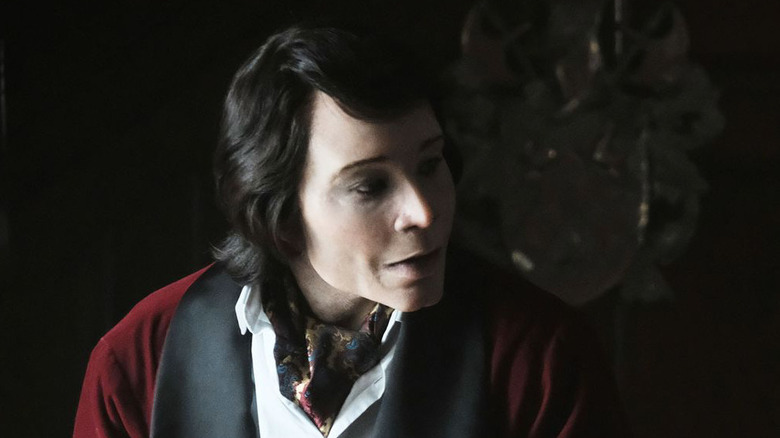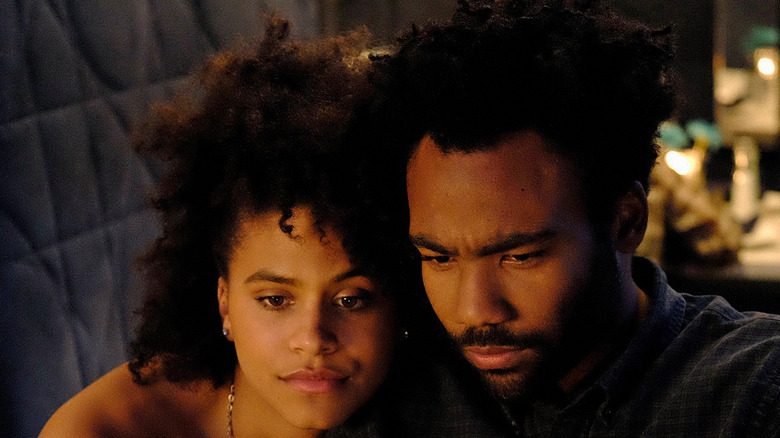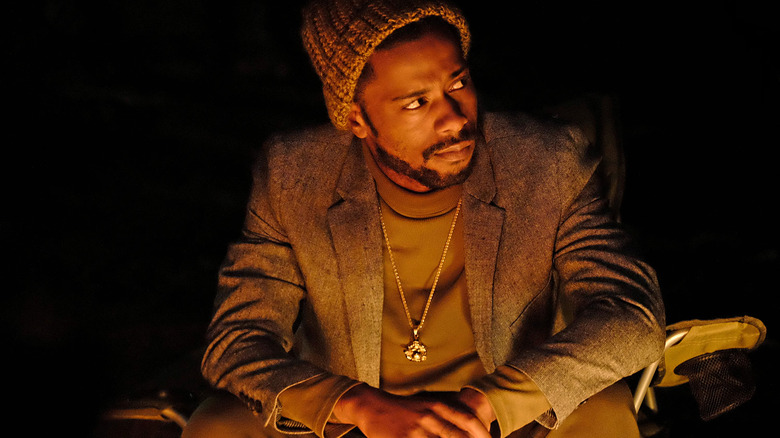The Untold Truth Of Atlanta
When it debuted in 2016, FX's "Atlanta" took the world by storm, a quiet conquest of talent, individuality, and ambiguity. The show, like its creator Donald Glover, has devoted itself to generating moments that vacillate between genres, tones, influences, and objectives, leaving its exact nature impossible to concisely describe. But, again like Glover, "Atlanta" immediately gives its fans reason to stay, regardless of where it travels or what new story it might tell. There's a level of quality to Glover's oeuvre, whether it be his writing, acting, directing, stand-up, production, or live performance, that made "Atlanta" an intriguing prospect from its first announcement.
Glover delivered on the hype from its very beginning and never let up, and "Atlanta" has enjoyed consistent critical and commercial success. At the heart of the show's success is a Vonnegut-esque humanism that always manages to shine through the muddy morality and cloudy surrealism. As you'd expect, a project of such subtlety and idiosyncrasy can only be produced under similarly unique circumstances. There are plenty of weird and surprising facts about "Atlanta," everywhere from its creation to its inevitable end. Here are some of those facts, ones that help reveal the untold truth of "Atlanta."
It began as a Trojan horse
You would be justified in thinking that "Atlanta" was always an easy sell. After all, Donald Glover was pitching it to FX. The same Donald Glover who helped define "30 Rock" in its first three seasons, kept "Community" alive (according to the show's creator), and had already proven his ability to write whatever he felt like and spin it into gold. And this was the same FX that had spent the last decade proving its truffle-pig-like ability to sniff out great comedies, hosting "It's Always Sunny In Philadelphia," "Archer," "Louie," and more. But, according to Glover, the only way he could get "Atlanta" past FX execs was to hide it in a Trojan horse.
As Glover told press backstage at the 2016 Golden Globes, after "Atlanta" took home two of the awards, "I told FX the show was something it wasn't until we got there and then hoped it would be enjoyable." Glover never specified exactly what shape the Trojan horse took, but given the popular comedies of the day, as well as his and FX's histories, it's likely he pitched a Trojan "Show About Nothing."
It's a family affair
At those same Golden Globes, Glover went even further back into the origins of "Atlanta," revealing it to be a longtime dream for him and his brother Stephen. Explaining the role that Stephen played in the show's creation, Glover told reporters that his brother showed him a letter he'd sent home while he was in college — a letter that said "Yo, I had this dream where we write a show together." When it came time to pitch FX a new show, Glover made sure that his dream came true, hiring Stephen as a writer, executive producer, and co-showrunner for the show's entire run.
Since the very first episodes of "Atlanta," Stephen has consistently proven himself more than a nepotistic flex on Glover's part. Among many other gems, Stephen penned the show's hit "Paper Boi" rap as well as season one's acclaimed exploration into alternate reality, "Nobody Beats the Biebs." He and Glover made the bizarre — and ultimately, genius — decision to include real-life figure Justin Bieber in the script, cast a Black actor in the role, and never address it in the episode. As Stephen told Vulture about their choice, "It's a good idea because it makes you ask yourself questions about the way you perceive Justin Bieber ... This is something we're never gonna get to see unless we do it ourselves."
It has a rare all-Black writing staff
Setting it apart from nearly every show on television, "Atlanta" has an all-Black writing staff. For a show determined to represent Black American lives authentically, that type of roster is especially impactful; in fact, to industry neophytes, it may seem like a hiring no-brainer. But it's hard to overstate how atypical that decision has historically been in Hollywood — in recent years, a number of major studies have attempted to highlight the problem by accurately quantifying it. A famous Color of Change report from 2017 found that during the 2016-2017 season, 65.4% of shows had no Black writers on their staff and another 17.3 had only one. Equally as damning, the report found that overall, only 4.8% of all employed writers were Black.
So what percent of writers' rooms are entirely Black? A number low enough for examples to make headlines. That's why Glover's choice to only hire Black writers made a splash, and the choice plays an obvious role in generating and maintaining the show's exceptional — and sometimes uncomfortable — realism. Glover has explained the decision time and again, not just invoking the sincerity it enables, but also the insight, at one point telling Vulture, "I wanted to show white people, you don't know everything about Black culture."
Glover won't rap, but he writes them
It's no secret that show creator Glover moonlights as a musician — he is, after all, a five-time Grammy-winning hip-hop artist. But Glover has always been adamant that his show about a rapper not star himself as that rapper. When Stephen Colbert asked Glover, "Why not play a rapper? You're a rapper. Go with what you know," Glover responded with his typical understated pithiness, saying simply, "That would have been wack to me."
Glover then went on to explain to Colbert how he felt his preexisting fame would undercut the show's underdog, everyman objectives. For Glover, who wanted his show to not only feel authentic but explore the meaning of authenticity itself, casting himself — a rich and famous young Hollywood icon — as a poor, struggling rapper on the streets of Atlanta, would have rendered any ambitions of authenticity moot. As a successful showrunner, however, Glover understands efficiency, so he does help write the show's music on occasion, like Bieber's "Forget About It All Night Long."
A Childish Gambino production
Though "Atlanta" chronicles the potential rise of fictional rapper Paper Boi instead of the actual rise of real-life rapper Childish Gambino, the rapper's fingerprints are nonetheless all over the show. Gambino is Glover, but it's not just Glover that influences the show — Gambino does, too, in a few major ways.
For one thing, the show's score comes from composer Ludwig Göransson, perhaps best known for winning an Academy Award and Grammy for his "Black Panther" soundtrack, but who also has produced and acted as multi-instrumentalist on every one of Childish Gambino's albums. The pair met while both were working on NBC's "Community" and hit it off due to the quality of Childish Gambino's music, which Göransson has referred to as "such an inspiration." In addition to Göransson, Glover chose frequent Childish Gambino music video director Hiro Murai to direct "Atlanta." The director, who filmed the videos for some of Gambino's biggest hits, including "3005" and This is America," had never actually directed TV before, which Glover found useful. As he told Vulture about Murai's unusual background, "I'm really glad, because when I'd ask him, 'Is this normal for a show?' he'd be like, 'I have no idea, I don't know.' But that's how we made something personal."
Everyone is high
In most episodes of "Atlanta," it's clear that many of the characters, if not all of them, are high. For some, like Darius, it can act as an important facet of their character or drive their decisions. For others, Like Earn or Van, it is just a fact of life, a helpful tool for relieving a fraction of the stress that permeates life as a working parent who wants more. But the characters of "Atlanta" are not alone in consistently taking the edge off — its cast and crew do, too.
When interviewed by the New Yorker, Glover — who was also high throughout the interview — revealed that in the writer's room and on the set, "We do everything high. The effortless chaos of 'Atlanta' — the moments of enlightenment, followed by an abrupt return to reality — is definitely shaped by weed." The fact that weed is so common in the production of "Atlanta" is a testament to the crew's skill as well as a reflection of one of the show's central points: the Black American experience brings with it a unique and pervasive set of stressors and pressures — ultimately, how any choose to deal with it is their choice.
Glover had to fight for language
When Glover ran the scripts for his pilot episode by FX executives, he was met with a specific pushback that, depending on your experience and outlook, is either inevitable or unbelievable. Execs told him not to use the N-word in the episode, and when Glover disputed the constraint, the execs consented to an odd — and oddly specific — compromise. As the New Yorker reports it, execs specified that "only a white character who says 'Really, n****?' and 'You know how n****s out here are' could use it."
Glover resorted to bringing in a seasoned executive producer, Paul Simms, who has gained a reputation among Black creators as a "white translator," helping explain creators' visions and necessities to execs in a language they evidently find more palatable. Eventually, Glover and Simms won out, and "Atlanta" has since included the word liberally, in a manner that the cast and crew feel is appropriate and accurate. That doesn't stop Glover from recalling the linguistic battle with disbelief, telling the New Yorker that "I'm Black, making a very Black show, and they're telling me I can't use the N-word! Only in a world run by white people would that happen."
Born of some surprising influences
There are few creative teams that have publicly cited a more diverse, even disparate set of inspirations than the team behind "Atlanta." Though perhaps that isn't so surprising, given Glover's famously multifaceted nature and the fact that neither director Murai nor most of the writing staff had ever created TV before. The rawness and quirkiness of the "Atlanta" crew show through — not just in their finished product, but in their influences as well.
Murai has cited "Louie" and "Adventure Time" as structural inspirations for the show, especially how the latter is "Very world-based. Sometimes the main characters won't even appear in an episode and the story will sort of detour with some side character." Glover told press that Season 2 was inspired by the format of "Tiny Toon Adventures: How I Spent My Summer Vacation." In the above Colbert interview, Glover likened "Atlanta" to "Curb Your Enthusiasm for rappers" and had previously referred to it as "Twin Peaks for rappers." Murai also cited the Coen brothers' ability to deftly balance multiple tones. Glover has cited the albums of Kanye West as inspiration, admitting to lining up his seasons as if they were West's releases.
Teddy Perkins lives
One of the most memorable entries in the "Atlanta" canon — which is saying a lot in a show where Katt Williams plays an Alligator Man and characters identify as "trans-racial" — is the Season 2 episode "Teddy Perkins." The episode sees Darius trapped in a dimly lit, decrepit mansion with an unsettling, vaguely threatening old man, apparently born Black but now white due to an extraordinary amount of plastic surgery. The old man, Perkins, looks just a touch inhuman, right in the uncanny valley sweet spot. His slow movement and quiet, forced speech only add to the creepiness. In short: "Teddy Perkins" was as near to an actual horror movie as "Atlanta" had ever ventured up to that point.
Perkins, though appearing elderly and white, was played by Glover himself. And Glover went all in on the role, staying in character as Perkins for the duration of filming. Actor Derrick Haywood, who played Perkins' elderly brother, revealed that Perkins' true identity was kept secret, even to fellow actors. He told Vulture, "I was introduced to him the night before at the fitting, but I didn't know it was Donald. And obviously, he didn't want you to know."
It made history
In 2017, "Atlanta" won the Golden Globe for Best Television Series — Musical or Comedy and Glover won for Best Actor in a Television Series — Musical or Comedy. Then, at that year's Emmy Awards, the momentum continued. Glover won Emmys for Outstanding Lead Actor in a Comedy Series and Outstanding Directing for a Comedy Series. The wave of success that "Atlanta" and Glover were riding in response to their first season was tremendous, and it was also historic.
Glover's win for directing was the first time a Black person had ever won an Emmy for directing comedy of any kind. And as the Los Angeles Times noted, Glover was the first director to win for a show in which they acted since Alan Alda won in 1977. Awards were not the only bragging point for "Atlanta," as its pilot set a new viewership record among basic cable comedies, and it managed to maintain the majority of its audience throughout its run. When all its ratings success is combined with the Peabody it received for "its seamless blend of vibrant character study and rich sociopolitical commentary," it becomes clear that "Atlanta" is more than just your average TV show.
It's not long for this world
Fans and critics can't get enough of "Atlanta," but its creator can. Despite the series' stellar fan following, critical reception, and cultural importance, Glover has repeatedly made it clear that "Atlanta" won't run for long. As early as 2018, he was quoted as saying, "'Atlanta' won't interest me much longer." FX later made that prediction official, announcing that Season 4 would be the last for "Atlanta." Glover explained the decision to reporters with a lengthy paragraph that can be easily boiled down to its opening sentence: "Death is natural."
As disappointed as many fans had to have been when they heard the news, those who have followed Glover for any sizable portion of his career had to have prepared for an early finale. Glover is famous for his short attention span, which caused him to quickly exit "30 Rock" and last only slightly longer on "Community." As former costar Danny Pudi has recalled, Glover's talent was so obvious that he knew he would move on almost immediately. It's worth remembering that short attention spans swing both ways, however, and the same restless drive that causes Glover to end projects can easily push him to revisit them. As he told reporters shortly after his "death is natural" speech, "If there's a reason to [come back to 'Atlanta'], of course ... It always depends. I like keeping my options open."
